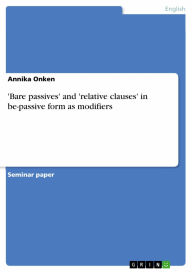'Bare passives' and 'relative clauses' in be-passive form as modifiers
by Annika Onken
2020-05-06 17:57:35
'Bare passives' and 'relative clauses' in be-passive form as modifiers
by Annika Onken
2020-05-06 17:57:35
Seminar paper from the year 2007 in the subject English Language and Literature Studies - Linguistics, grade: 1,3, University of Münster, 9 entries in the bibliography, language: English, abstract: 1Introduction
In order to learn more...
Read more
Seminar paper from the year 2007 in the subject English Language and Literature Studies - Linguistics, grade: 1,3, University of Münster, 9 entries in the bibliography, language: English, abstract: 1Introduction
In order to learn more about the English language and how it is actually used by the native speaker community I am going to investigate the occurrence of bare passives as modifiers and of relative clauses in be-passive form which can be compared to the former in its function as modifier. With help of the queries I will find out how many of these constructions exist in The Penn Treebank and then take a closer look at the beginning of sentences. Which of these two grammatical phenomenon is more frequent at the beginnings of sentences and why? Firstly in this term paper, I will introduce the grammatical phenomenon of the passive voice with its variants 'be-passive', 'get-passive' and 'bare passive' by contrasting it to the active voice. Furthermore I will explain the development of the different queries needed for the research whose findings will be discussed subsequent to that.
Less






























